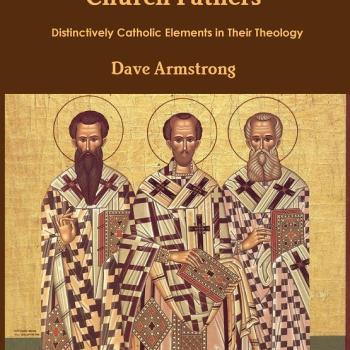
Acts 26:18 (RSV) . . . that they may turn from darkness to light and from the power of Satan to God, that they may receive forgiveness of sins and a place among those who are sanctified by faith in me.
Protestantism formally separated sanctification from justification in a way contrary to the Bible. Justification saves through faith alone, according to their view. Sanctification and good works, on the other hand, are definitely encouraged and regarded as necessary in the Christian life, but are not a cause of either justification or salvation; only God’s grace and our faith accomplish that. This is the classic Protestant “faith alone” doctrine, or sola fide in Latin, and one of the two “pillars” of the so-called Reformation, along with sola Scriptura (“Bible alone”).
The above passage contradicts this understanding, by directly tying salvation and faith to sanctification. Salvation (with regeneration) is expressed in three different ways in this verse. This is our Lord Jesus speaking to St. Paul at his conversion. The fact that one is sanctified by having faith in Jesus makes it impossible to separate sanctification and justification in a neat little package with a bow. They’re intrinsically connected. Therefore, sanctification does have something to do with both justification and salvation. It doesn’t say, “will be sanctified” or “will be progressively sanctified.” Rather, they “are” along with or alongside having faith in Jesus.
The Amplified Bible even puts it in a past tense: ” those who have been sanctified (set apart, made holy) by faith in Me.” So does New American Standard Bible: “those who have been sanctified by faith in Me.” Wuest is identical to NASB, except for “. . . which is in me.” Here are some other versions:
Young’s Literal Translation: . . . their receiving forgiveness of sins, and a lot among those having been sanctified, by faith that is toward me.
Phillips: . . . those who are made holy by their faith in me.
Literal Emphasis Translation: . . . that they might receive the remission of sins and inheritance among those having been sanctified by faith that is in Me.
Berean Literal Bible: . . . that they may receive forgiveness of sins and an inheritance among those having been sanctified by faith in Me.
Barclay: . . . those who through faith in me have become God’s consecrated people.
***
“Please Hit ‘Subscribe’”! If you have received benefit from this or any of my other 4,600+ articles, please follow this blog by signing up (with your email address) on the sidebar to the right (you may have to scroll down a bit), above where there is an icon bar, “Sign Me Up!”: to receive notice when I post a new blog article. This is the equivalent of subscribing to a YouTube channel. Please also consider following me on Twitter / X and purchasing one or more of my 55 books. All of this helps me get more exposure, and (however little!) more income for my full-time apologetics work. Thanks so much and happy reading!
***
So how do the classic Protestant commentaries handle this and try to synthesize it with standard “faith alone” soteriology?
Calvin’s Commentaries: Some do read it falsely in one text, among those who are sanctified by faith, because this word is extended unto the whole period. Therefore, the meaning thereof is, that by faith we come unto the possession of all those good things which are offered by the gospel.
Calvin implies that faith is first and then the “good thing” of sanctification is enabled to come into the life of the believer later. This is the attempted separation of justification and sanctification that is not in this text (so it’s eisegesis), since the sanctification is either contemporaneous with the faith or even described in several translations as a fait accompli by means of the faith (i.e., it’s referred to in the past tense). Bottom line: it first perfectly with Catholic soteriology, and at best is only an awkward force-fit with Protestant soteriology.
Jamieson-Fausset-Brown Bible Commentary: Faith is here made the instrument of salvation at once in its first stage, forgiveness, and its last, admission to the home of the sanctified . . .
This is the same “chronologically erroneous” explanation that Calvin offered.
Cambridge Bible for Schools and Colleges: And here “sanctified,” as so often “saint” in St Paul’s Epistles, is applied to those who have been set on the way of salvation, . . .
This is the same sort of attempt again. Granted, we all (hopefully!) grow in holiness and righteousness and lack of sin, but the text does say that sanctification occurs along with faith, with several assuming it was a past event also.
Gill’s Exposition of the Entire Bible: they are sanctified “in” him through the imputation of the holiness of his human nature to them, which is a branch of their justification before God . . . by faith that is in me, is not to be connected with the word “sanctified”, but with the word “receive”, in the preceding clause; and has respect to both benefits, which it receives from Christ
Gill also tries — I think, unsuccessfully — to separate the two things that Jesus combined together.
Ellicott’s Commentary for English Readers: Better, have been sanctified; the Greek participle being in the perfect. The word, as always, expresses primarily the idea of a completed consecration rather than of a perfected holiness (Hebrews 9:13; Hebrews 10:10; Hebrews 13:12); but the one thought passes naturally into the other. The last six words may be connected grammatically either with “sanctified” or with “receive.” On internal grounds the latter is, perhaps, the best construction. Faith, i.e., is theoretically connected with “forgiveness of sins,” as well as with the “inheritance,” which implies sanctification.
Ellicott, an Anglican, exegetes the text essentially in the same way that Catholics would. And (what a surprise!) I think he’s correct.
Matthew Poole’s Commentary: By faith that is in me; by faith which purifieth the heart; but this may be referred, either to our being sanctified, or to our receiving of the inheritance, for both are by faith . . .
Matthew Poole (1624–1679), a Presbyterian, offers a surprisingly “Catholic” take, which sounds very much like our doctrine of infused justification (including sanctification within itself).
Adam Clarke’s Commentary: And as the inheritance is said to be among them that are Sanctified, this is a farther proof that αφεσις ἁμαρτιων signifies, not only the forgiveness of sins, but also the purification of the heart.
The Methodist Clarke also closely approaches the Catholic “infused justification” interpretation.
I think that this verse offers a largely unexplored serious and interesting exegetical argument against justification by faith alone apart from any works at all, and imputed justification.
*
Practical Matters: Perhaps some of my 4,800+ free online articles (the most comprehensive “one-stop” Catholic apologetics site) or fifty-five books have helped you (by God’s grace) to decide to become Catholic or to return to the Church, or better understand some doctrines and why we believe them.
Or you may believe my work is worthy to support for the purpose of apologetics and evangelism in general. If so, please seriously consider a much-needed financial contribution. I’m always in need of more funds: especially monthly support. “The laborer is worthy of his wages” (1 Tim 5:18, NKJV). 1 December 2021 was my 20th anniversary as a full-time Catholic apologist, and February 2022 marked the 25th anniversary of my blog.
PayPal donations are the easiest: just send to my email address: apologistdave@gmail.com. Here’s also a second page to get to PayPal. You’ll see the term “Catholic Used Book Service”, which is my old side-business. To learn about the different methods of contributing (including Zelle), see my page: About Catholic Apologist Dave Armstrong / Donation Information. Thanks a million from the bottom of my heart!
*
***
*
Photo Credit: Saint Paul Writing His Epistles (c. 1618-1620); attributed to Valentin de Boulogne (1591-1632) [public domain / Wikimedia Commons]
Summary: I examine Acts 26:18: a Bible passage that I believe is manifestly contrary to the Protestant belief in “faith alone” (sola fide) for justification apart from sanctification.

















